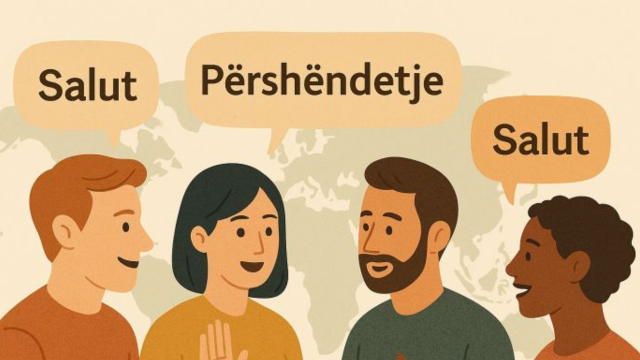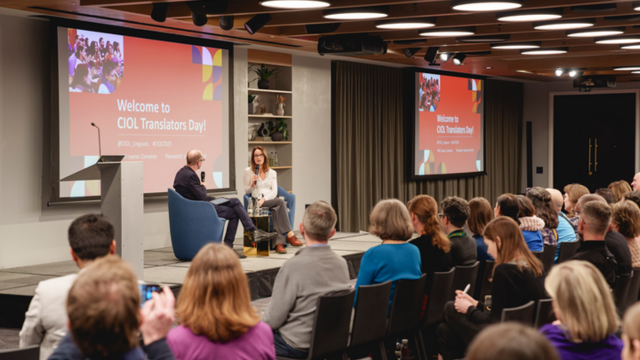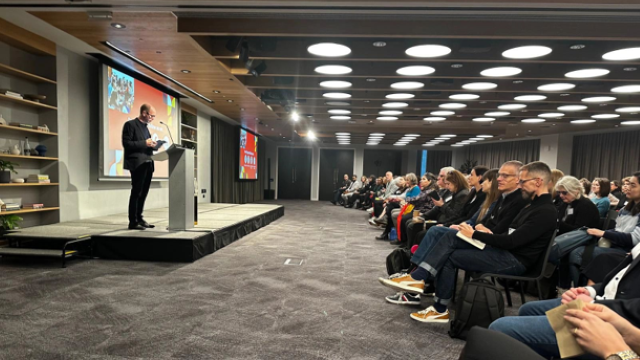-
QUALIFICATIONS
- For Linguists Worldwide
- For UK Public Services
- Preparation
- Policies & Regulation
-
MEMBERSHIP
- Join CIOL
- Membership grades
- NEW for Language Lovers
- Chartered Linguist
- Already a member?
- Professional conduct
- Business & Corporate Partners
-
ASSESSMENTS
- For Second Language Speakers
- English as a Second Language
-
EVENTS & TRAINING
- CPD, Webinars & Training
- CIOL Conference Season 2025
- Events & Networks
- CIOL Mentoring
-
NEWS & VOICES
- News & Voices
- CIOL eNews
- CIOL Awards
- The Linguist
- Jobs & Ads
-
RESOURCES
- For Translators & Interpreters
- For Universities & Students
- Standards & Norms
- CIOL & AI
- All Party Parliamentary Group
- In the UK
- UK Public Services
- Find-a-Linguist
The State of the Profession: Make Your Voice Heard
By Dr Joseph Lambert

"Happy robots” - AI and robots are now literally everywhere..! Photo from Joseph’s recent trip to Copenhagen.
What are the biggest threats and opportunities to you as a professional freelance translator today? Are you happy with your rates of pay and working conditions? What is the longer-term outlook for the translation profession?
These are just a few of the crucial questions that we are hoping to explore in a new research project funded by the British Academy.
While Nimdzi valued the global language services industry at a very healthy $69.3 billion in 2023 and forecast growth to $90.8 billion by 2027, there are growing concerns about the long-term attractiveness and sustainability of the freelance translation profession, especially in the UK.
Recently, we’ve seen increased reports of talent shortages, concerns over satisfaction and pay, and perennial Doomsday prognoses as a result of developments in MT and AI. And while there is undoubtedly cause for concern in certain contexts, this may not paint the full picture. In such a complex, varied industry, many translators are happy and continue to thrive, either bucking the trends or successfully negotiating certain challenges.
For all the media hype around technological breakthroughs, the human side of the profession is all too frequently overlooked by wider society, and even by those within our own industry. This project aims to get to the heart of how translators actually feel and to find out what really matters in terms of your professional situation and general wellbeing.
In October, we are therefore launching an exploratory survey (which you can access via the link below) covering key issues that we believe matter to you, including money, working conditions, wellbeing, status, and satisfaction. The survey will take about 20-25 minutes to complete, is completely anonymous, and will be followed by a prize draw to thank you for sharing your expertise, insights, and time.
Once the survey has closed, we will share our findings via blogs, journal and magazine articles, podcasts, and conference presentations to ensure that the industry realities we observe are fed back to you as translators, with the ultimate aim of shedding some much needed light on these tough questions.
After analysing our survey data, we will also run a series of follow-up focus groups with translators across the UK. These will allow us to dig into key questions in more depth, and ultimately to capture the mood of freelance translators across the UK.
Of course, we will also share these findings with you as part of our desire to foster meaningful dialogue between academia and industry. While academic research can sometimes fail to dovetail neatly with professional realities, ultimately our hope is to achieve results that can positively impact the translation industry.
This is because we believe that by understanding the realities of working life for professional translators, we can start disentangling the complex relationship between status, pay, and working conditions and, consequently, help foster solidarity among translation professionals. The aim is to empower you as professionals to better adapt to current changes in the industry, and to ensure that your profession continues to develop in a manner that is ethical, sustainable, and supportive of your needs as individuals.
Access the survey here.
If you’d like any further details, please contact Dr Joseph Lambert at lambertj3@cardiff.ac.uk
Dr Joseph Lambert is a Lecturer in Translation Studies at Cardiff University and teaches across the BA and MA programmes in Translation. His primary area of research interest is the ethics of translation. He also has significant experience as a freelance translator.
Dr Joseph Lambert presents with Dr Callum Walker at CIOL Translators Day on 15 March 2024.
Views expressed on CIOL Voices are those of the writer and may not represent those of the wider membership or CIOL.
Filter by category
More
The Chartered Institute of Linguists (CIOL), Incorporated by Royal Charter, Registered in England and Wales Number RC 000808 and the IoL Educational Trust (IoLET), trading as CIOL Qualifications, Company limited by Guarantee, Registered in England and Wales Number 04297497 and Registered Charity Number 1090263. CIOL is a not-for-profit organisation.








